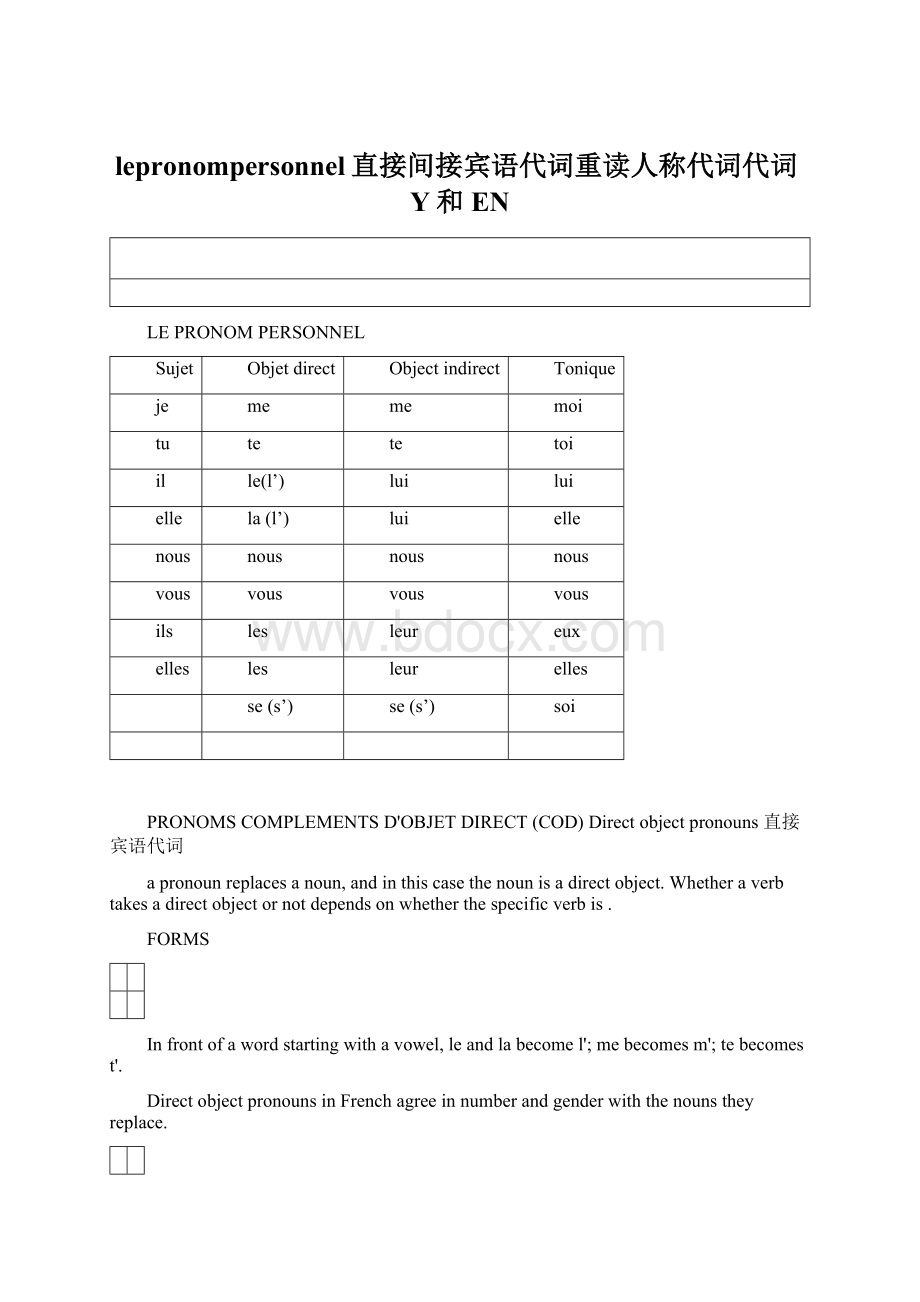lepronompersonnel直接间接宾语代词重读人称代词代词Y和EN.docx
《lepronompersonnel直接间接宾语代词重读人称代词代词Y和EN.docx》由会员分享,可在线阅读,更多相关《lepronompersonnel直接间接宾语代词重读人称代词代词Y和EN.docx(9页珍藏版)》请在冰豆网上搜索。

lepronompersonnel直接间接宾语代词重读人称代词代词Y和EN
LEPRONOMPERSONNEL
Sujet
Objetdirect
Objectindirect
Tonique
je
me
me
moi
tu
te
te
toi
il
le(l’)
lui
lui
elle
la(l’)
lui
elle
nous
nous
nous
nous
vous
vous
vous
vous
ils
les
leur
eux
elles
les
leur
elles
se(s’)
se(s’)
soi
PRONOMSCOMPLEMENTSD'OBJETDIRECT(COD)Directobjectpronouns直接宾语代词
apronounreplacesanoun,andinthiscasethenounisadirectobject.Whetheraverbtakesadirectobjectornotdependsonwhetherthespecificverbis.
FORMS
Infrontofawordstartingwithavowel,leandlabecomel';mebecomesm';tebecomest'.
DirectobjectpronounsinFrenchagreeinnumberandgenderwiththenounstheyreplace.
Notethatle/l'canreplaceanadjectiveorverbeornomattribut(lesverbessontalorslesverbsêtre,sembler,devenir,paraître)orunepropositionobjetdirectorpropositioninfinitive
注意:
le(l’)能代替的情形:
(不用管阴阳性,不用管单复数)形容词,作为表语的名词,分句作为直接宾语的,分句是动词原型的。
TexetTammysontamoureux?
Oui,ilslesont.
Ilssontetudieants-ilslesont.
Joe-Bob:
Tuveuxquej'appelleTammy?
Tex:
Non,moi,jevaislefaire
Jeveuxquetuviennesdemain-jeleveux
Jeveuxpartirdemain-jeleveux
Elleespèreêtrereçueàsonexamen-ellel’espère
PLACEMENT:
Directobjectpronounsprecedetheverbofwhichtheyaretheobject.Inacomposedtense(likethepassécomposé),thepronounprecedestheauxiliary.Ininfinitiveconstructions,thepronoungoesimmediatelybeforetheinfinitive.Whenthe
conjugatedverbisnegative,theneprecedestheobjectpronoun.放在动词前,放在助动词前,放在原形动词前,ne放在代词前
Bette:
Soisraisonnable,Tammy.Texneveutpast'épouser.
Bette:
Bereasonable,Tammy.Texdoesn'twanttomarryyou.
Tammy:
Maissi.Ill'apromisquandjel'airencontréàLyon.
Tammy:
Yeshedoes.HepromisedwhenImethiminLyon.
Bette:
Maisilnem'avaitpasencorerencontrée!
Bette:
Buthehadn'tyetmetme!
Inthenegativeimperative,thepronounfollowsthenormalplacementbeforetheverb.However,intheaffirmativeimperative,theobjectpronoungoesaftertheverbandisattachedtoitbyahyphen.Inaddition,meandtebecomemoiandtoi.在否定的祈使句中,直接宾语位置形式不用变,可是在确信祈使句中直接宾语代词要变成重读人称代词,moi,toi,放在用连词符放在动词后面.(就只是toi,和moi,别的不用在祈使句中变成重读人称)
Bette:
Tex,embrasse-moi!
Bette:
Tex,kissme!
Joe-Bob:
Attends,nel'embrassepasdevantmoi.Jem'envais.
Joe-Bob:
Wait,don'tkissherinfrontofme.I'mleaving.
AGREEMENTOFTHEPASTPARTICIPLE
Thepastparticipleagreesingenderandinnumberwithaprecedingdirectobject.Inotherwords,ifthedirectobjectpronounisfeminine,addanetotheendofthepast
participle;ifthepronounismasculineplural,addans(unlessthepastparticiplealreadyendsins);ifitisfeminineplural,addes.
直接宾语代词放在复合过去式时,过去分词的性数要和直接宾语代词相同,详见passécompose那里
PRONOMSCOMPLEMENTSD'INDIRECT(COI)Directobjectpronouns间接宾语代词
FORMSANDUSES
Anindirectobjectisapersonwhichreceivestheactionofaverbindirectly.InFrenchtheindirectobjectisalwaysprecededbytheprepositionàandinEnglishbythepreposition'to':
Anindirectobjectpronounindicatesà+aperson.
(人不是物!
!
!
)
PLACEMENTthesamewiththeCODhowever,thereisnoagreementinpassécompose.放的位置的直接宾语一样,可是在复合过去式中,就算提早了,过去分词的性数也没有转变。
在祈使句中的用法也和直宾一样。
LEPRONOMYETEN
Y
yexpressingplace
Yreplacesaprepositionindicatinglocationplusitsobject:
'àUT'(atUT),'devantlaTour'(infrontoftheTower).Itisusuallytranslatedasthere.Prepositionswhichindicatelocationincludeà,en,dans,devant,derrière,sous,sur.Thenounobjectsoftheseprepositionsareplacesandthingswhichindicateaplace.Theexceptionistheprepositionchezwhichisusedwithaperson,asin'chezBette'(Bette'splace).
Y作为代词代替地址状语:
à等表示地址的介词+地址或表示地址的名词。
ywithcertainverbs
Withcertainverbsyreplacestheprepositionàwhenitsobjectisanideaorthing,butnotaperson.Someoftheseverbsarepenserà,réfléchirà(tothinkabout),s'intéresserà(tobeinterestedin),répondreà(toanswerto),participerà(toparticipatein).Intheseexpressions,theprepositionàisidiomatic.Itdoesnotindicatelocationinormovementtoward.
在某些特定的词中y代替A+OBJECT,当那个object是(nomdechose,nomabstrait)表示事物的名词,而不是表示人的宾语,当碰到表示人的宾语时要用间接宾语,或用重读人称代词(看具体的动词)
EN
Enisapronounthattypicallyreplacesde+anoun;thisincludesnounsintroducedbypartitiveorindefinitedeterminers(de,du,del',dela,des).Enmaybetranslatedas'some','any',or'notany'.
En代替名词的数量:
用部份冠词或不定冠词+名词做直接宾语
看en代替的意义是特指仍是泛指。
Jeveuxdespommes-j’enveux
Jeveuxlespommes-jelesveux
Voicilesraisins,mangez-en(这是我买的葡萄,吃一点吧)
Voicilesraisins,mangez-les(全吃了吧)
Inasimilarfashion,enreplacesanounintroducedbyanumberoranexpressionofquantity.
一.做直接宾语,
1.可替代由部份冠词(du,dela,del’,des)或复数不定冠词(des)加名词组成的直接宾语,在否定式中替代de+名词。
Veux-tudupoisson?
—Oui,j’enveux.(en=dupoisson)
—Non,jen’enveuxpas.(en=depoisson)
(经常使用动词不定式有:
vouloir,prendre,manger,acheter)
2.可替代数量词(un/une/deux/trois/vingt/cent/mille...)后面的名词,数量词需重复,语意才完整。
Tuasuneidée?
—Oui,j’enaimille.(en=idées)
【注:
en能够被形容词修饰,修饰en的形容词要与en所替代的名词性数一致。
(en是复数时,de放在该复数形容词前面)】
例如:
’aiunerobebleueetj’enaiaussiunerouge.(en=robe)
despoupées?
—Oui,elleenadebelles.(en=poupées)
3.可替代数量副词短语中的介词de+名词。
如:
beaucoupde,tropde,assezde,unpeude(指少的),peude(表达否定,几乎没有)...
Aimez-vouslechocolat?
—Oui,j’enmangebeaucoup.(en=dechocolat)
4.可替代泛指形容词(quelques)+名词结构中的名词,其中泛指形容词要转换成泛指代词。
VousavezdesamisenFrance?
—Oui,nousenavonsquelques-uns.(Nousavonsquelquesamis,en=amis,泛指形容词quelques变成泛指代词quelques-uns)
Enalsoreplacesexpressionsintroducedbytheprepositiondewiththefollowingverbs:
s'occuperde,todealwith
parlerde,tospeakof
remercierde,tothankfor
revenirde,toreturnfrom
venirde,tocomefrom
Notethatadisjunctivepronounisusedwiththeseverbstoreplaceexpressionswhentheobjectoftheprepostiondeisapersonratherthanathing.
1.在动词中替代由介词de所引导的间接宾语(verbe+de+qqch),不能代人。
(宾语是人,用de+重读人称代词替代)
当动词词组de后面加的是动词原形时,那么用le来代变,可是当de右面加的时名词时就用重读人称代词或en(看人仍是物)
2.可替代由介词de所引导的形容词补语,de+quelquechose,该形容词在句中一样是表语。
être+adj+de+qqcheg.Content,heureux,satisfait
3.可替代由介词de所引导地址补语:
(现在也把它叫副代词:
de+lieu)
代词的词序
宾语代词
1
2
3
4
5
Me
Le
Lui
Te
La
Leur
Y
En
Se
Les
Nous
Vous
祈使句中的语序
1)代词在动词后面
2)直接宾语(le,la,les)在间接宾语前面
3)祈使句中me和te会变成moi和toi,放在en前时要变成m’和t’
Montre-moitonlivre---montre-le–moi(direct,indirect)
Donnez–les-nous---donnez–m’en
LEPRONONSTONIQUESDISJUNCTIVEPRONOUNS重读人称代词
Disjunctivepronouns(alsoknownastonicorstressedpronouns)refertopeoplewhosenameshavealreadybeenmentionedorwhoseidentityisobviousfromcontext.TheyareusedinavarietyofsituationsinFrench,mostofteninshortanswerswithoutverbs,foremphasis,orforcontrastwithsubjectpronouns.
Uses
•afterprepositions在介词以后
Chezelle
•inshortanswersorexclamationswhennoverbisexpressed做省略语
insimpleagreementsordisagreementswhennoverbisexpressed
Pasmoi!
•withni...ni,ne...quecomme,que以后代词
Jen'aimequetoimachérie.
•inacompoundsubjectorobject
Texetmoi,nousaimonsallerenboîte.
•foremphasis作为同位语表强调
Eux,ilss'amusent
•afterc'estorcesont,iln’yaque…(sb.isnottheonlyone在c’est以后,作表语表示强调:
C'estmoileplusnul.
•with-même,tomean'-self'
toi-même
•incomparisons
Ilestplusrichequemoi
Soi的用法
Lepronomrenvoieàonouàunpronomindéfinisujet(chacun,toutlemonde,personne)
Chacuntravaillepoursoi.
间接宾语代词,y和重读人称代词在代替à+nom用法区别
重读人称代词放在介词后,而间接宾语代词放在动词前,介词省略
Y :
à后面随着是表事物和地址的名词
间接宾语代词:
lui/leur :
à+人名或表示人的名词(后面把介词去掉)
重读人称代词:
所有的自反代词,当直接宾语是metesenousvous时
一些特定的动词词组眼前
Eg.Êtreà/faireattentionà/penserà/prendregardeà/rêverà/tenirà
Pronomconjoint(lui)/pronomdisjoint(àlui)?
•LeCOIestunepersonneuniquement(Verbesd'échange)>Pronomsconjoints:
ENVOYERqchÀquelqu'un
J'envoieunelettreàmonamie.
Jeluienvoieunelettre.
ACHETERqchÀquelqu'un
CHANTERqchÀquelqu'un
DEMANDERqchÀquelqu'un
DIREqchÀquelqu'un
DONNERqchÀquelqu'un
ÉCRIREqchÀquelqu'un
EXPLIQUERqchÀquelqu'un
FAIREqchÀquelqu'un
FAIRECONFIANCEÀquelqu'un
LIREqchÀquelqu'un
MONTRERqchÀquelqu'un
OBÉIRÀquelqu'un
PARLERdeqchÀquelqu'un
PRENDREqchÀquelqu'un
RACONTERqchÀquelqu'un
...
•LeCOIestindifféremmentunechoseouunepersonne>Youpronomsdisjoints:
PENSERÀquelquechose
PENSERÀquelqu'un
Jepenseàmesvacances.
Jepenseàmonami.
J'ypense.
Jepenseàlui.
ÊTREOPPOSÉÀquelquechose
ÊTREOPPOSÉÀquelqu'un
FAIREATTENTIONÀquelquechose
FAIREATTENTIONÀquelqu'un
S'INTÉRESSERÀquelquechose
S'INTÉRESSERÀquelqu'un
RENONCERÀquelquechose
RENONCERÀquelqu'un
SONGERÀquelquechose
SONGERÀquelqu'un
SEJOINDREÀquelquechose
SEJOINDREÀquelqu'un
TENIRÀquelquechose
TENIRÀquelqu'un
S'ASSOCIERÀquelquechose
S'ASSOCIERÀquelqu'un
...